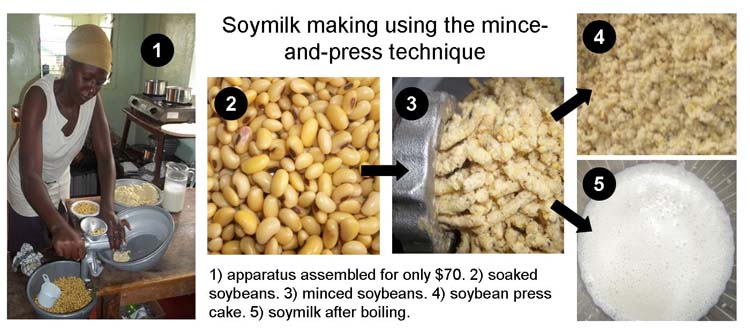West Kenya enjoys two growing seasons per year and we are presently engaged in the 2012 long rains. Twenty-five dissemination partners have installed 50 demonstrations, distributed BNF technology kits to 8000 new households and are preparing for 25 farmer field days to be held between 18 June and 15 July. In addition, we have over 6500 Progressing Farmers that are growing soybeans on at least 0.2 ha. Several mechanisms for input supply are being explored including credit for purchasing BIOFIX inoculant and Sympal fertilizer from MEA Fertilizer Ltd. through rotating funds via repayment in grain to farmer associations and the training and short-term provision of credit to local agro-dealers stocking these products for the first time. Our first attempts last season to arrange credit through local banks and crop insurance did not succeed, largely because we did not provide sufficient time to meet their many, and sometimes changing, requirements but efforts in this area continue. Promasidor (a major soybean buyer in Kenya) stepped in at the last minute and purchased inputs for deployment to cooperators by its buyer, Smart Logistics.
One exciting development is field experimentation with experimental inoculant strains for soybean and climbing bean identified by the University of Nairobi MIRCEN. Seven candidate elite native rhizobia are being compared to three industry standard strains in the field for the first time. In this way, the best rhizobia recovered from farmers’ fields last year are now being returned to them for evaluation. MIRCEN is currently examining the suitability of these strain for both promiscuous and specific soybeans in potted soils. MIRCEN has also developed a simple bioassay that screens candidate elite strains for competitive ability as well as effectiveness at BNF. Results from these efforts are expected by mid-August and cooperators in other countries are invited to help us compare the best strains under a wider range of conditions. Concerns over the increased expression of soybean rust are being met both by fungicide application and identification of resistant varieties. Syngenta provided outreach partners with sprayers and training in the strategic application of Amistar. SeedCo variety Squire appears particularly resistant to rust. These advances, combined with cereal-soybean rotation promise to keep rust in check. Our management recommendations for soybean were formalized into a 27-point best-practices checklist, translated into Kiswahili and 12,000 copies printed.
Market access is now assured among participating communities. Last season, 25 sets of grain processing kits consisting of scales, moisture meters, tarpaulins and branded sacks were deployed to outreach partners. At harvest, Smart Logistics announced interest in purchasing soybeans and 16 cooperators responded by bulking and selling 217 tons of soybean worth $142,000 while retaining 78 tons of seed for planting in the current season. UNIDO is opening three soybean processing centers in west Kenya requiring 18 tons of grain per month, and looks to N2Africa cooperators as suppliers. These products will be distributed by the Red Cross as famine relief foods throughout Africa. One of our challenges this season is to reinforce soybean processing at the community level. Cooperators have developed a number of products including fried soy nuts, protein fortified flour, roasted soy beverage and soymilk. Soymilk is now being prepared in several local communities using a simple mince-and-press technique requiring an initial investment of $70 and offering a return of 5 to 1 (see photo and table). Pronounced nutritional benefits of soymilk were noted among malnourished children receiving three 300 ml servings per day. The Mama Soybean Shop has opened in Luanda town by Kleen Homes and Gardens that specializes in processed soybean products including delicious fruit-soybean milk yoghurts. Clearly, soybean enterprise has taken root among Kenyan smallholders with multiple opportunities and benefits to rural communities.


Paul Woomer for the West Kenya Outreach Team
